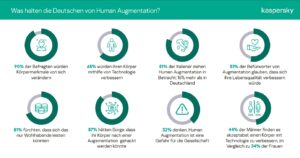
Perhaps in the future employers will be looking for employees with bionic brain optimization: 16 percent of Germans are open to increasing intelligence through human augmentation, but cybersecurity aspects must not be neglected.
A chip in the brain with a direct connection to the Internet - sounds like a good idea, at least for many users. An international Kaspersky study has shown that more than one in five (22 percent) - if he or she were given the opportunity - would have their own intelligence potential optimized through technological help. In Germany, 16 percent answered in the affirmative. In addition, more than half (52 percent) of study participants worldwide believe that it is “acceptable” to use human augmentation to improve children's academic performance. Among the German survey participants, the value was 42 percent.
Physical optimization: human augmentation
Human augmentation is the process of physical optimization of the body with the help of technology, for example by inserting a chip into the brain, smart glasses or the use of exoskeletons to improve physical abilities to accelerate its functionality or immediately via the Internet to be able to access a wide range of information.
Interest in increasing brain performance is highest among the 18-34-year-olds - also in Germany - at 27 percent and decreases with increasing age to 22 percent (in Germany 17 percent) among 35-54-year-olds. Among those over 55, interest in such a technological optimization drops to 17 percent (in Germany 10 percent). In terms of gender, the opinion on this is relatively balanced. Internationally, women (23 percent) are slightly more interested than men (22 percent) in improving brain capacity and intelligence. In Germany, the value is the same for both sexes at 16 percent.
Greater level of thinking and intelligence

Extract from the Kaspersky study “The Future of Human Augmentation 2020; Opportunity or Dangerous Dream? "
The idea of increasing the level of intellectual ability and intelligence through technology met with the highest approval in Romania, where more than a third (35 percent) would be interested in improving their own intellectual capacities - followed by Hungary and Morocco 30 percent each. Interest was lowest in Denmark (12 percent), Germany and Greece (16 percent each). However, nearly half (49 percent) of respondents believe that it is “totally” or “largely” acceptable to use human augmentation technology to make people generally smarter. In Germany, 44 percent agreed with this statement.
Kaspersky's broad study entitled "The Future of Human Augmentation 2020: Opportunity or Dangerous Dream?" - surveying 14.500 adults in 16 countries in Europe and North Africa - found that almost two-thirds (63 percent) would consider it to improve their bodies with technology - be it permanently or temporarily. In Germany, this was even reported by 65 percent. The Italians surveyed, at 81 percent, agreed the most, with the British at 33 percent the least, to consider a technology-based optimization of their body. Some respondents even expressed a desire to connect smartphones to their bodies.
Safety must be the top priority
“IT security is becoming a central and extremely relevant factor in the further development of human augmentation technologies. Because there is a risk that it will develop further outside the control of governments or other supervisory authorities, which could potentially be dangerous for mankind, ”comments Marco Preuss, head of the research and analysis team at Kaspersky in Europe. “This is a point that we should pay particular attention to. At Kaspersky, for example, we previously investigated how chips implanted in the brain can be misused by cyber criminals to hack an individual's memory and use the information obtained in a malicious manner. Expanding the capacity of the human brain through augmentation opens up a truly amazing range of potential cyber threats. "
Human augmentation also has far-reaching effects on society, especially in education and in the workplace. Some leading technological thinkers even suggest that chips implanted in the brain could help address mental health problems and improve performance.
Increasing intelligence and thinking power raises practical questions:
- Is human augmentation safe in this area from a health point of view?
- Is optimizing human capacities ethically justifiable? For example, should parents allow their children's brains to be tweaked to give them an edge in school?
- Will it give people an unfair advantage in the workplace, creating an even wider digital divide?
- Most of the respondents want human augmentation for the benefit of mankind, with more than half (53 percent worldwide and 51 percent in Germany, 51 percent in Austria and 53 percent in Switzerland) of the opinion that they are used to improve the quality of life should.
The international report "The Future of Human Augmentation 2020: Opportunity or Dangerous Dream?" Is available online free of charge.
More on this at Kaspersky.com
About Kaspersky Kaspersky is an international cybersecurity company founded in 1997. Kaspersky's in-depth threat intelligence and security expertise serve as the basis for innovative security solutions and services to protect companies, critical infrastructures, governments and private users worldwide. The company's comprehensive security portfolio includes leading endpoint protection as well as a range of specialized security solutions and services to defend against complex and evolving cyber threats. Kaspersky technologies protect over 400 million users and 250.000 corporate customers. More information about Kaspersky can be found at www.kaspersky.com/
